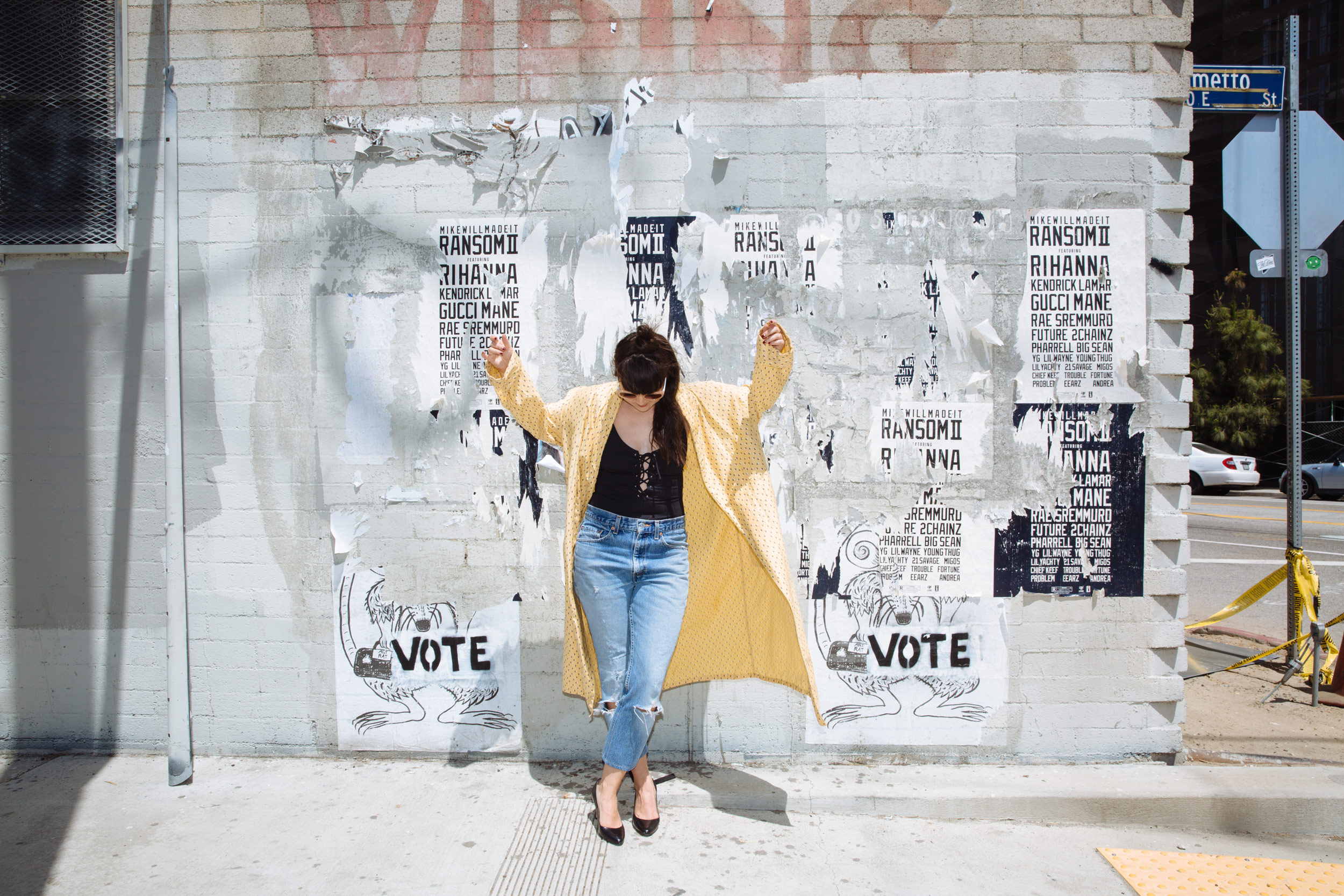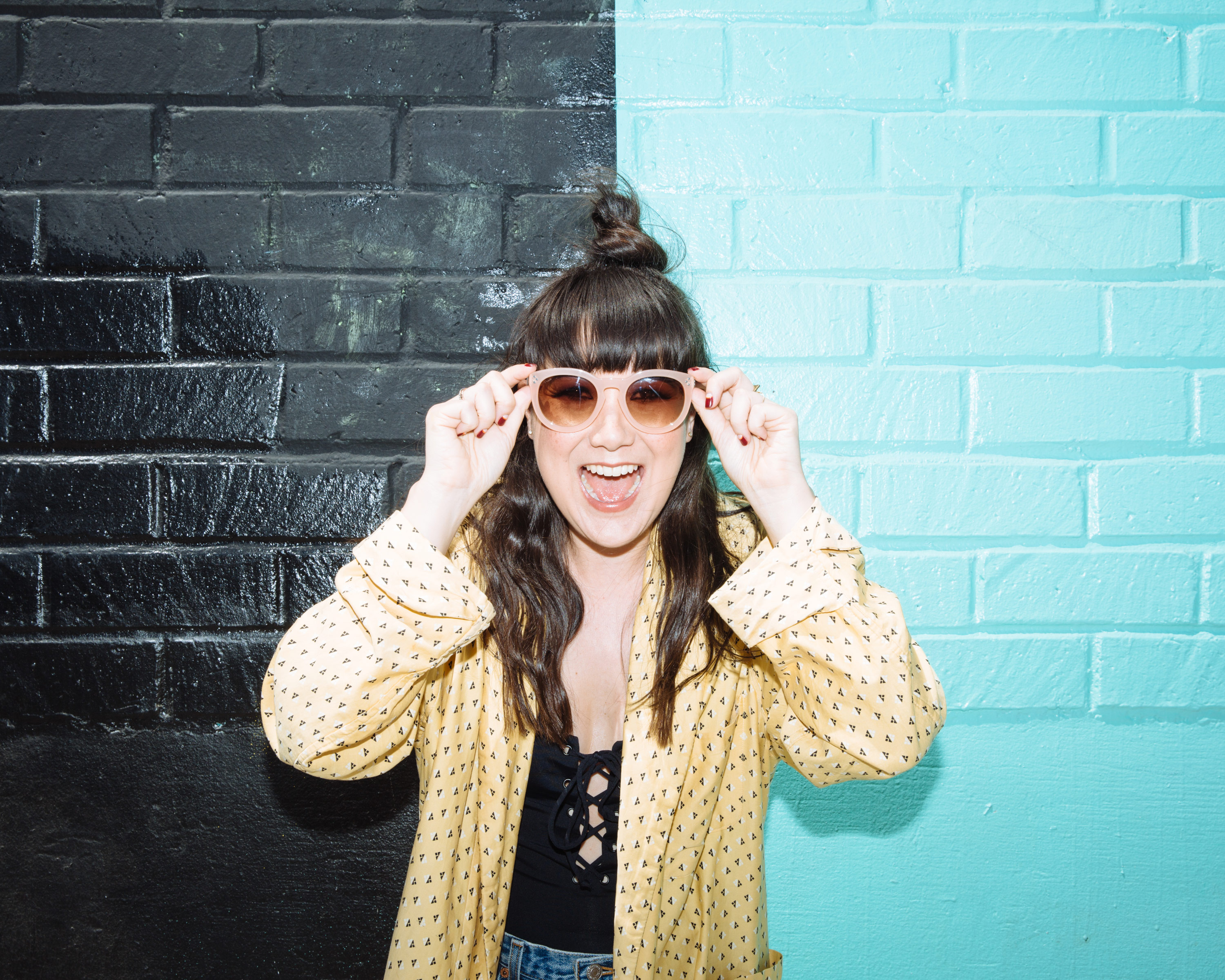
- Interview by Tina Essmaker May 9, 2017
- Photography by Lauren Randolph
Sonja Rasula
- entrepreneur
Sonja Rasula moved to LA to work in TV, but when her path didn’t go as planned, she embraced the unexpected. Here, she recalls how her involvement in local politics led to her becoming an entrepreneur and the founder of The Unique Space, CAMP, and Unique Markets, how she’s accomplishing her mission to empower artists in practical ways, and why, if you want something, you’ve gotta put your heart and soul into it and give it everything you’ve got.
Tell me about where you grew up and how your childhood influenced your creativity. I grew up in Los Angeles in an area called Echo Park, which is now the cool area. In the 1970s and 1980s, there were a lot of gangs and it was a bit of a rough neighborhood, but it was also racially and socioeconomically diverse.
My family lived in the hills where there tended to be a lot of writers, artists, movie producers, professors, and architects. They were all very hippie, liked culture, and understood the dynamics of community and neighborhood. That was really special and affected my childhood and creativity.
For school, I was bussed out of my neighborhood to a public school that focused on the arts. Because of that, I had the amazing chance and opportunity to explore the arts from a young age.
At what point did you have an idea of the path that your career might take? Well, my family moved from LA to Canada when I was 14. I spent my high school years on the freezing cold East Coast. It was typically Canadian and I went from being a preteen misfit who liked skateboarding and malls to someone who loved canoeing and backpacking. It was a weird transition.
I went to university in Toronto and studied journalism. I did all four years, but I’m missing a French credit, so I never officially graduated. It’s funny because both of my parents are academics, but I don’t have a college degree. Clearly, I don’t think I needed one.
I thought I was going to be a writer and editor my whole life. Words were my first love. To this day, I love reading and writing, and I appreciate great editing and journalism. But at some point in my twenties, I veered and started to focus on online journalism. That was in a time when few people were paying attention to the internet. I was in the right place at the right time and went far quickly at a young age. In my mid-twenties, I worked for Fortune 500 companies, had employees under me, and managed million-dollar budgets. It was a strange life compared to my other friends in their twenties. It was great, but the whole time I was building brands and audiences and pushing content out for other companies, I felt like there was something missing.
I moved back to LA with the thought that I was going to revolutionize TV. That did not happen. Instead, that’s when I started Unique LA and began doing the work I do now. The path was not straight, though.
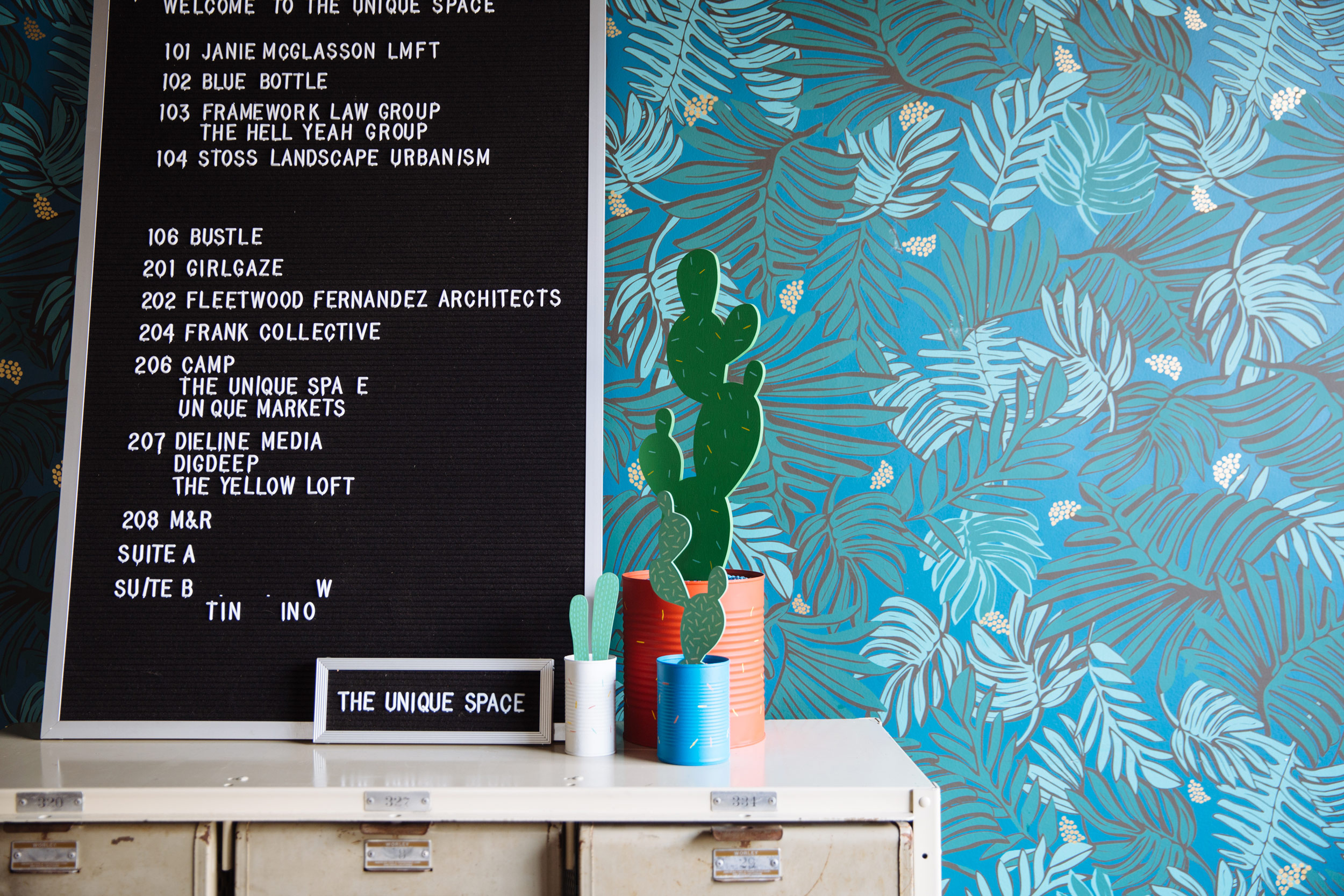
“I moved back to LA with the thought that I was going to revolutionize TV. That did not happen. Instead, that’s when I started Unique LA and began doing the work I do now. The path was not straight, though.”
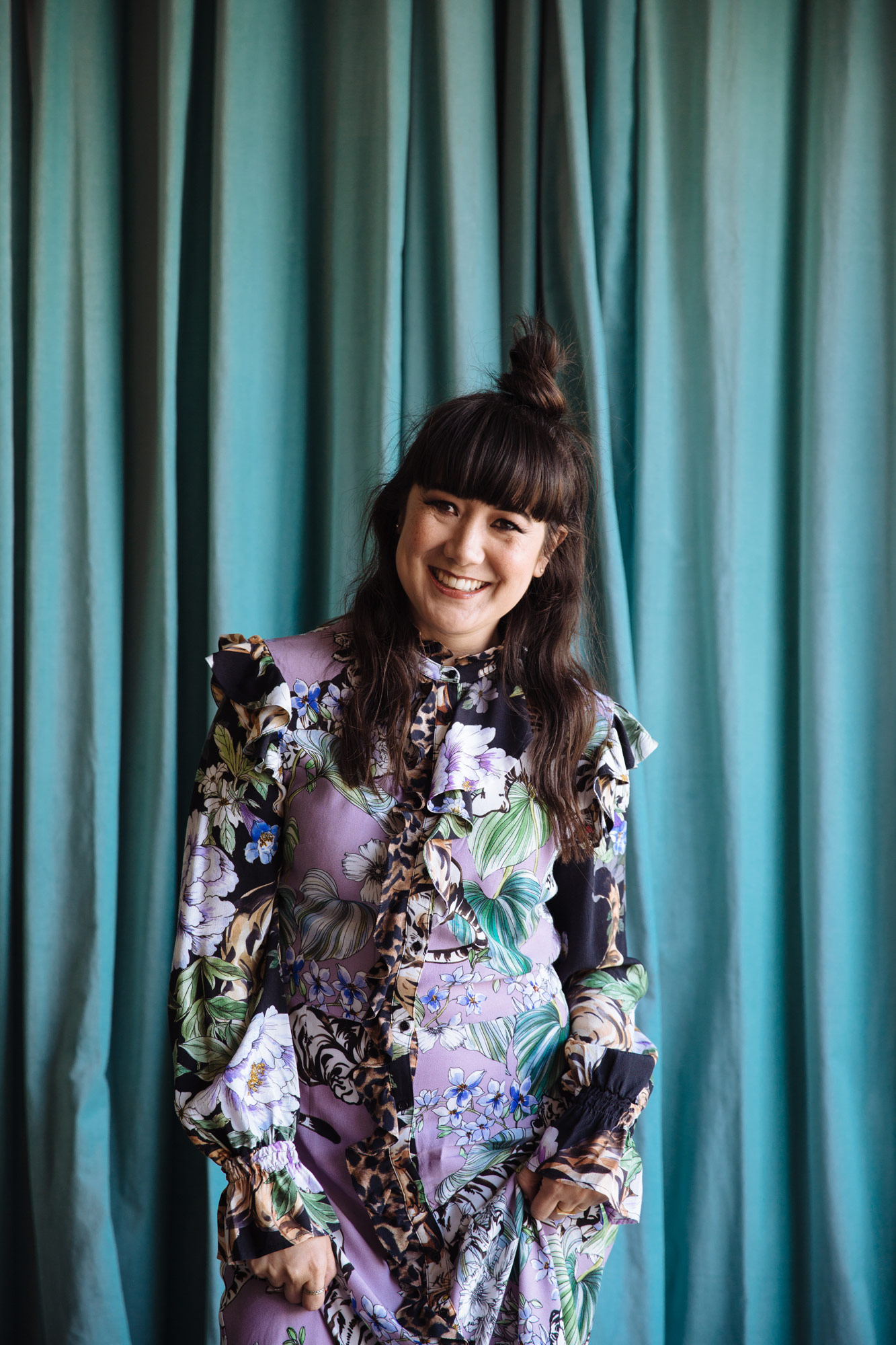
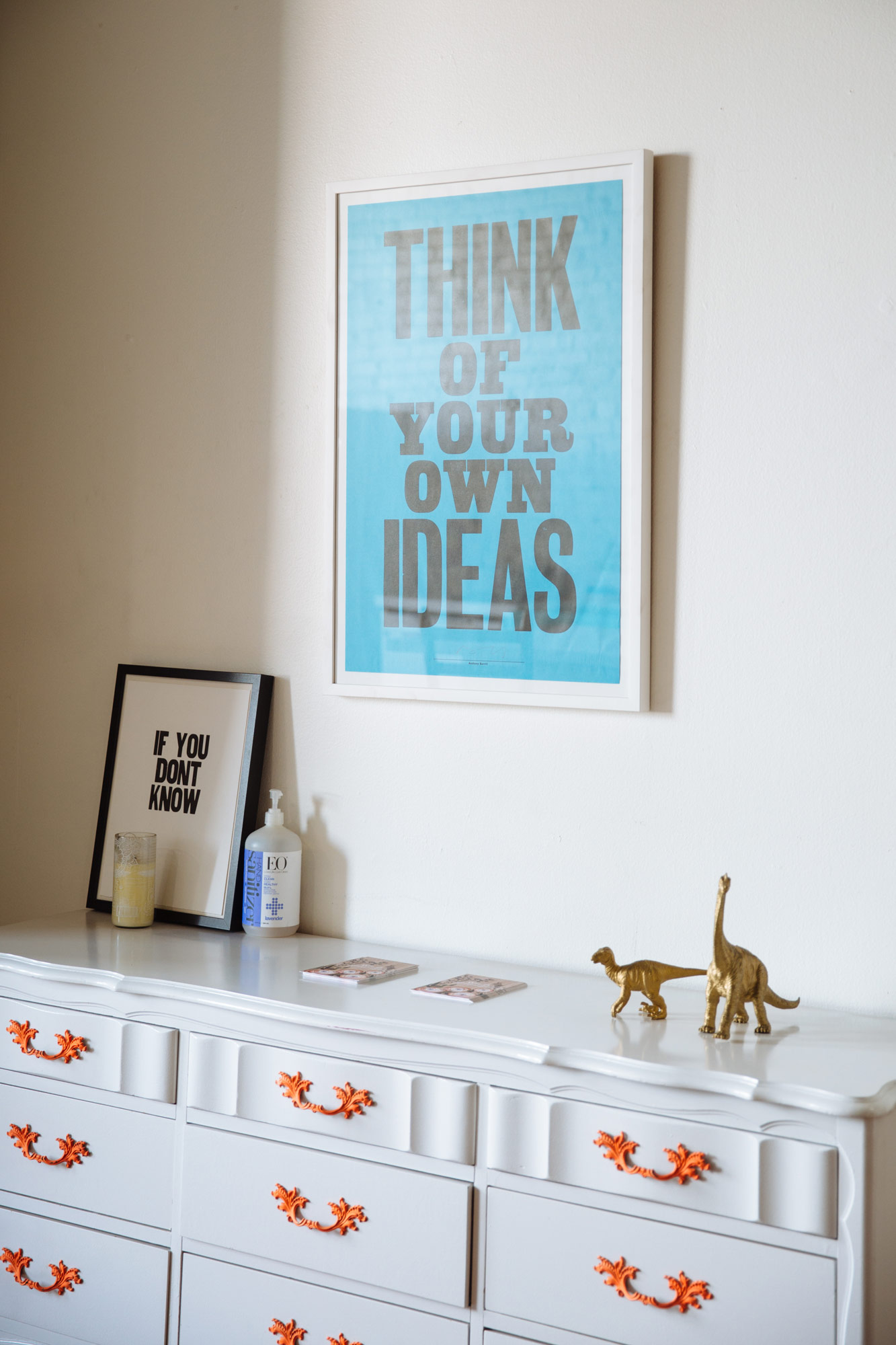
Let’s dig into that more. I did enough research to know that you were on an interior design show on HGTV in Canada before you moved to LA to pursue TV. How did that happen? I was essentially the director of a bunch of TV stations’ websites and HGTV was one of them. When I sat in on meetings, I was often the only woman in the room, the only person under 35, and the only non-white person; I’m half-Chinese, half-Finnish. We had meetings with VPs of the company and they said they needed more diversity on air. One day in a meeting, someone said to me, “Wait, Sonja, didn’t you go to journalism school? Can you be on TV?” That’s how it happened. They asked if I had designed anything and I said, “Of course,” even though I hadn’t. But I had always loved art and architecture, even as a kid. Design, architecture, and interior design were things I studied, so I decided to fake it till I made it.
So then you moved to LA with plans to continue being on TV. You tried out and got hired for a job, but got fired, right? This is terrible. I moved to LA with zero contacts. In Toronto, I was a high-roller, a big fish in a small sea. I had every contact in the world. I moved to LA and I couldn’t even get interviews for jobs. I applied to hundreds of jobs and didn’t get one interview. One day I was on Craigslist and I saw an ad that was for a new TV show and wanted interior designers with camera experience, so I applied. I had no idea what it was for. I got it, and it was Trading Spaces, which had been one of my favorite shows. I was offered the job and got the axe very quickly after that.
Being fired is an interesting experience because you’re left with this feeling of, “What did I do wrong?” And you don’t ever really know because they don’t tell you. You’re in this weird, insecure space. You start to question everything. I think I was fired because the show didn’t do well. It only aired for a few episodes before it was cancelled.
How did that apparent moment of failure affect your trajectory and what did you learn about yourself? Los Angeles is a magical place, especially for dreamers. I had some savings, so I knew it would be okay to not work for a while. I did a lot of wandering and exploring the city and got to know the different communities. It was 2007, and the most important election—at least at that time—was coming up, so I decided to dedicate myself to volunteering and knew I could give 6–12 months.
I became the volunteer director of a nonprofit whose goal was to get people in their twenties and thirties to vote in local elections. Obviously, we were excited about Obama, but we were more excited about the fact that because the press was so vocal about the upcoming election we could help spread the word about how important it is to vote local and vote all of the way down the ballot.
I spent a lot of months pounding the pavement and registering voters, and I got to know a lot of city officials. I become intertwined in local politics. Eric Garcetti, who is now our mayor, was a city councilor at the time, so I got to know him. All of this community work started to inspire me and set my course for doing something more community-minded as opposed to opening an online store.
There was this moment when I was sitting in my car trying to shop for a friend and wondered why there wasn’t a giant community-based shopping event in LA. New York had Brooklyn Flea, and I had come from Toronto, which had several large-scale shopping events. It boggled my mind that LA didn’t have one. I decided then and there that that was what I wanted to do. I knew people in the city who could help and point me in the right direction because I had no clue how to start a business.
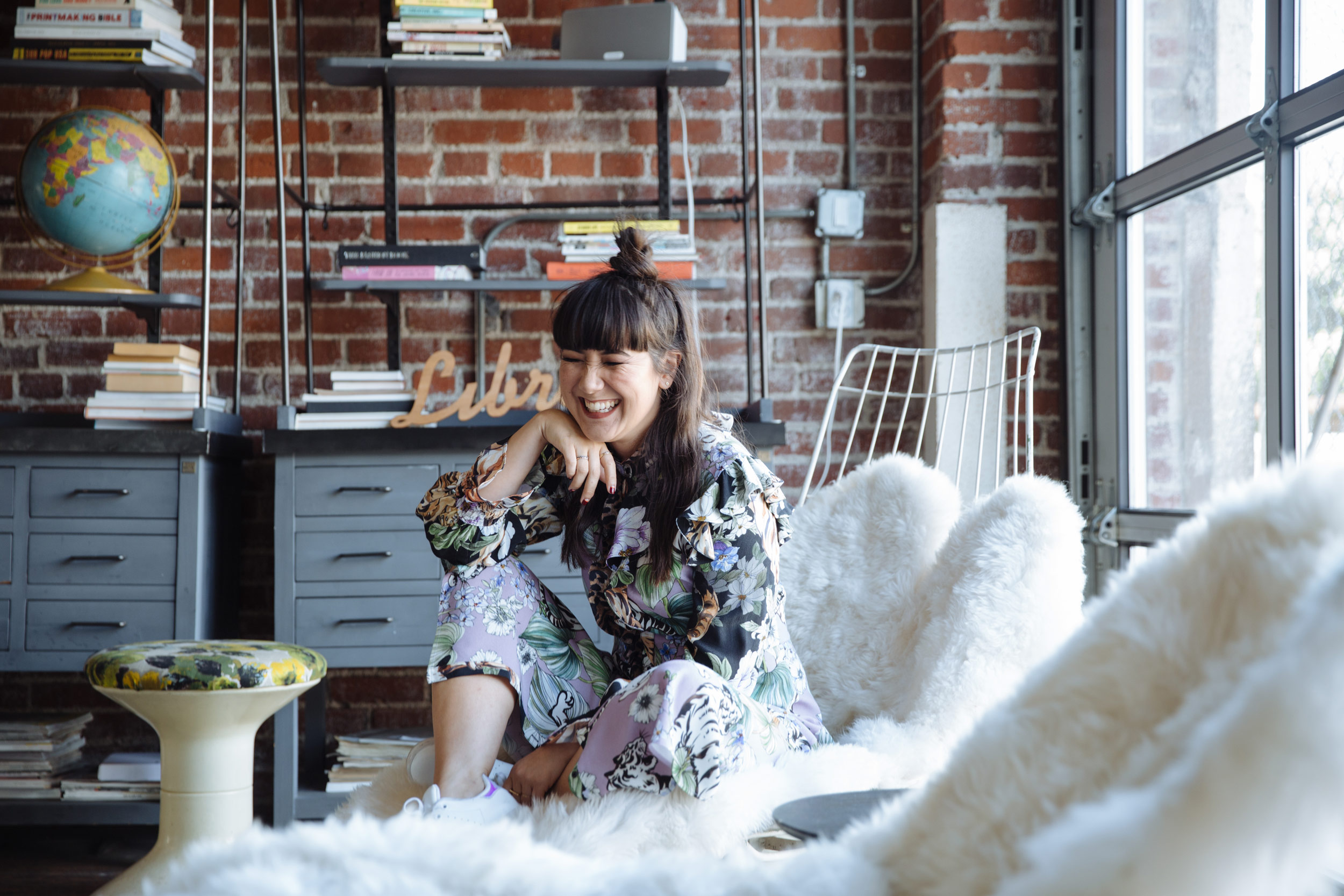
“A big reason I started the Unique LA market was to show younger generations that you can make a living while being an artist or creative, because that’s not ever really shown.”
And that’s when you started Unique LA? Tell me about the process. I’m sure there were challenges along the way. Yep! I decided to start something called Unique LA, but the overarching brand is Unique Markets. Essentially, I am pretty fearless, so I took every penny of my savings and 401k to pay for the venue. Once I had the venue, I knew it was go time. My goal was to have over 200 vendors at the first event and we had 225. It was a challenge to talk to people about it for the first few months and try to convince them to take part. LA had nothing like it and LA was more known for sample sales. The only reason people came to Downtown LA was for Ed Hardy and Juicy Couture sample sales.
I knew a very different LA. It was filled with great clothing and jewelry designers and independent artists, but that wasn’t what the world thought of. I wanted to show the rest of the world that LA is actually a great city—it’s not just Hollywood and the beach. So I created Unique LA and I called people on the phone and begged them to participate. I was hung up on, people asked whether I had any event planning experience (which I didn’t), people told me they Googled me and didn’t see anything about me online. I had to work really hard, but it paid off. Instantly, the event was a success. At the end of the day, I only profited a few thousand dollars—but I profited. I didn’t lose anything, which was a miracle. At that point, I realized that it might become my full-time job. That was December 2008.
How often is that event? We do Unique LA three times a year: in the spring, summer, and holiday season. We’ve also done one in New York and San Francisco. I’m hoping to come back to New York this year.
It’s interesting to me that your passion for the community in LA stemmed from an unexpected shift in your path. You combined the desire to be part of something bigger than yourself with the creative community to create Unique LA. Out of that, you later launched CAMP and The Unique Space. Tell me about those. With Unique LA, just under a thousand small business owners participate every year. After a few years, I realized that I was getting a lot of emails and phone calls asking for advice, references, and resources. But they weren’t questions I could answer. I realized there was a need for a business conference or something to help these artists and creatives who are small business owners, but don’t have formal business training. They were coming to me for help, even though I didn’t have the answers.
That was when a spark went off and I realized that this idea I had before I started Unique LA could potentially come to fruition. When I first moved to LA and didn’t have a job, I worked from my apartment and watched a lot of daytime TV. One day Michael Eisner, the former CEO of Disney, was a guest on Kelly & Regis. He talked about how he had been a camp counselor and he was promoting a book he had just written called Camp. The reason for the book was to let everyone know that he had learned everything he needed to be a great CEO at summer camp.
I went to summer camp and then I became a counselor in training, and then I became a counselor. I drank the Kool-Aid. I was enamored and went out and bought the book immediately. It was everything I believe, which is adults should allow themselves to act like kids again and force themselves into situations where they feel uncomfortable. When you go to camp, your parents pack you up and send you away for a few weeks and you don’t have any adult figures to tell you what to do. You have to make decisions, communicate, and form new friendships. And you’re sleeping surrounded by strangers, which is super weird and awkward.
I didn’t know what to do with the information I read in the book, but four years later when people came to me for advice, I realized, oh, that idea you had to start a summer camp for adults might actually fit into what everyone seems to need, which is help, advice, and community. That’s how CAMP happened. I reached out to a group of friends, told them the idea, and asked them to be speakers or workshop leaders. We took it from there. CAMP has been a special and unique experience for me to share with the world.
This is the seventh CAMP in five years. It’s actually the last CAMP. It’s the end of a great run for a few different reasons I’m putting pause on CAMP and starting something that’s more accessible that we can duplicate in cities. One of the things we realized is that a lot of parents can’t get away for four days. I think we’re going to try to be that same experience in a two-day conference and take it to different cities.
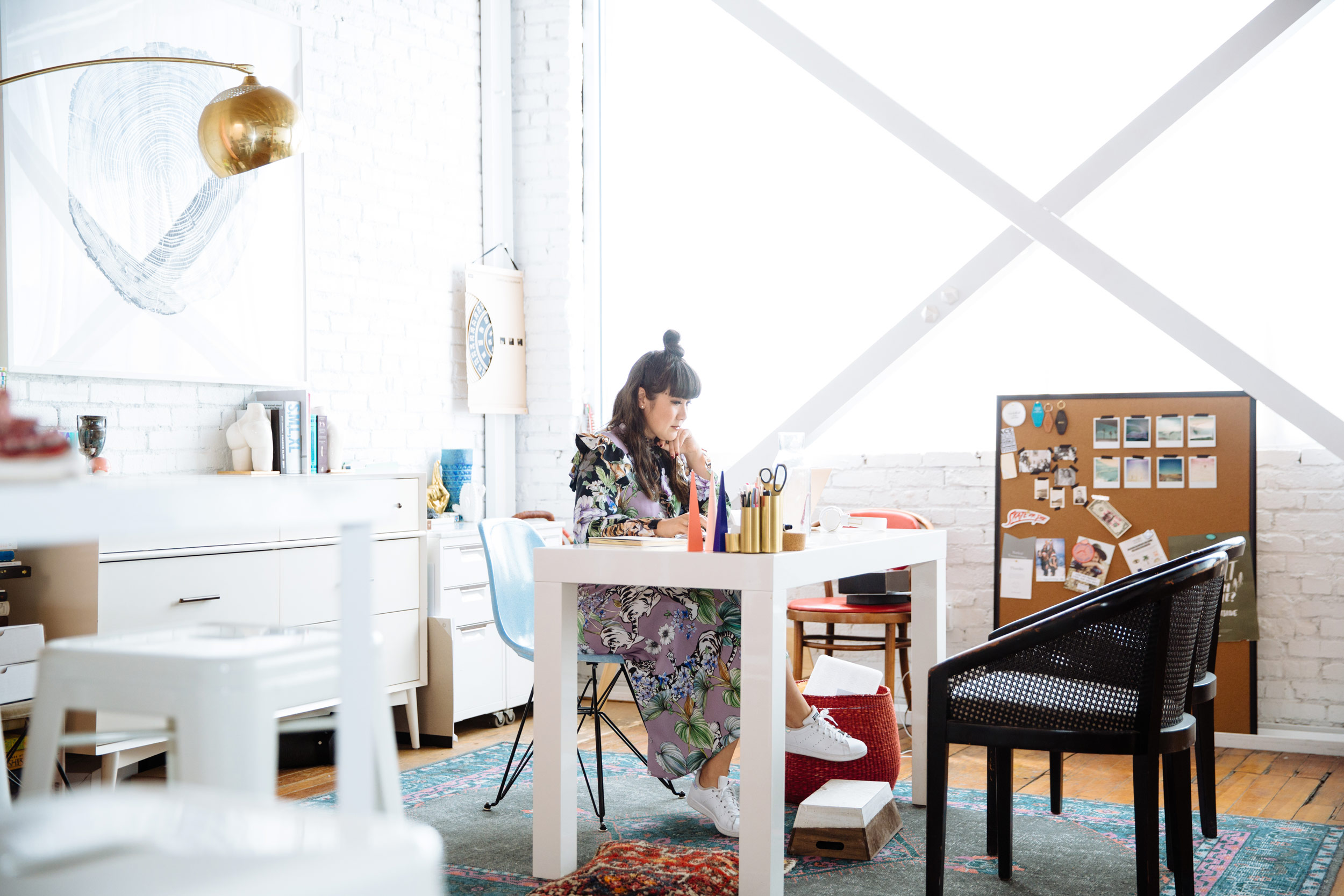
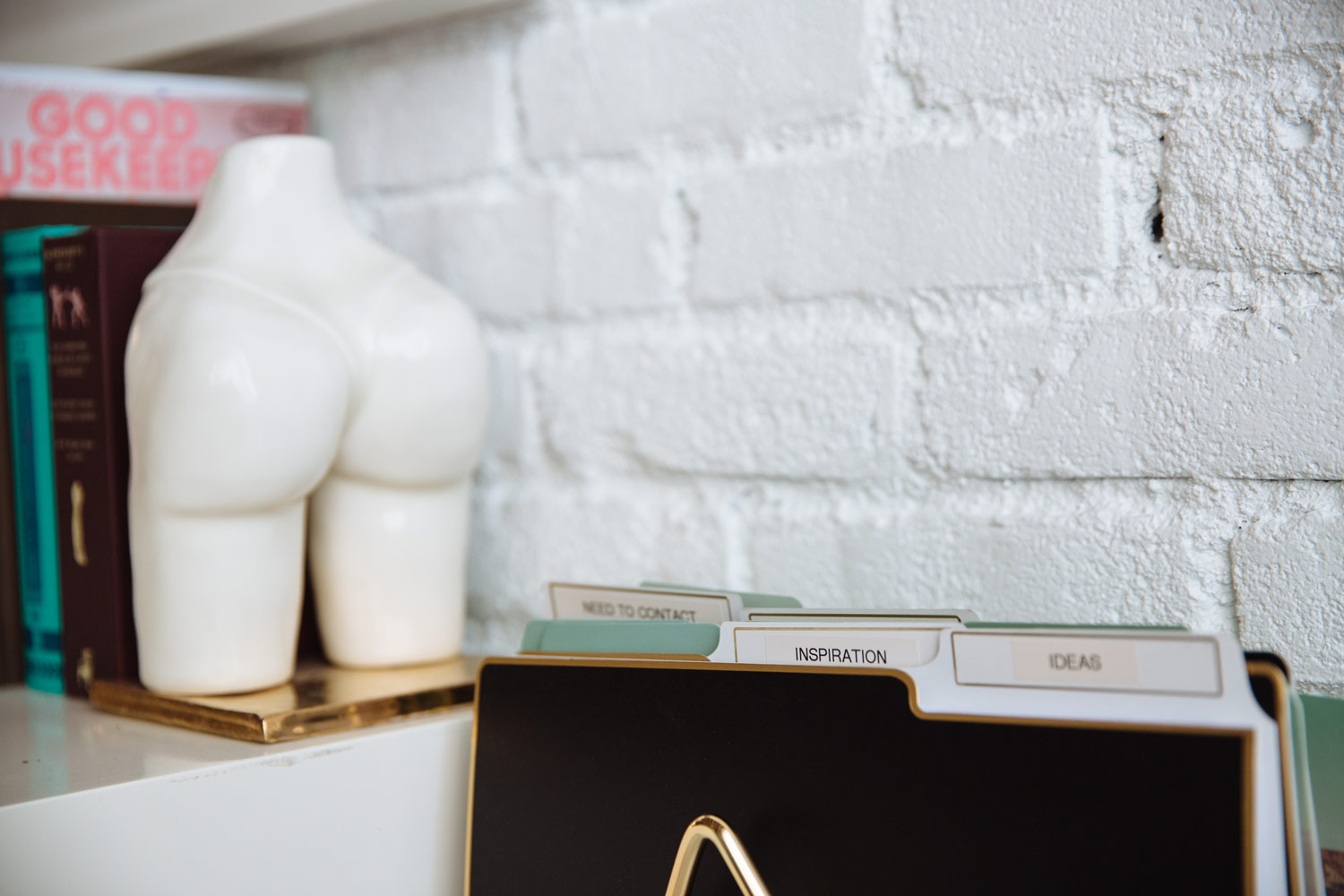
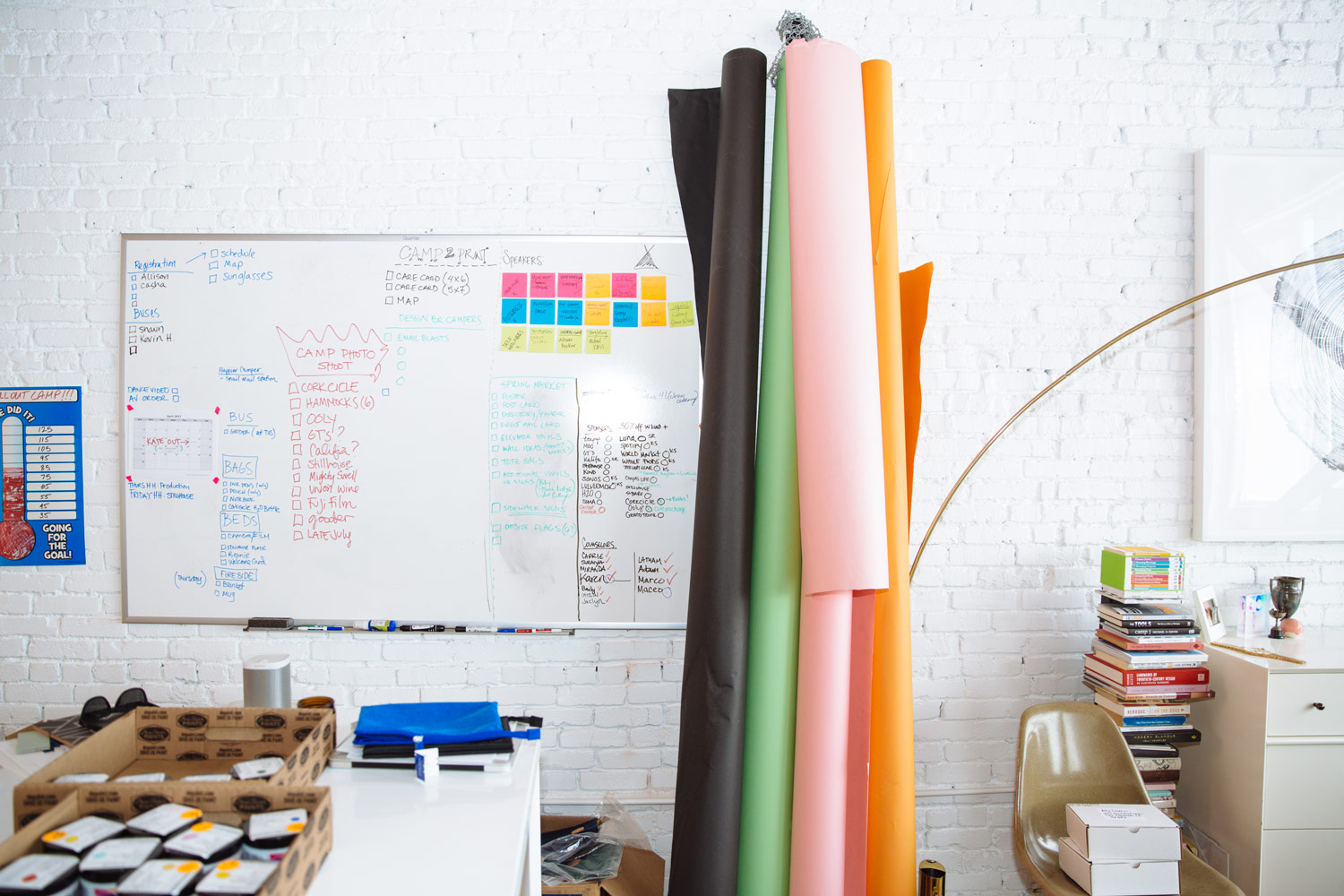
“The mantra we use that translates to all three businesses is, ‘We believe in people.’ My goal is to empower people. With my current businesses, that means helping entrepreneurs reach markets, educating them, and providing a space for them.”
That’s really wonderful. You also have a physical space in LA, right? Yes. The Unique Space is in a really old warehouse in the Arts District. Traditionally, the area was full of warehouses that held food. This building is over a hundred years old and was being used for production, but had been empty for many decades. I fell in love with it and redesigned it to make a permanent space for entrepreneurs—people like you and I who need office space and want something that has more of a sense of community.
The Unique Space now houses 18 private offices. We have such amazing tenants; we have everyone from lawyers and accountants who focus on helping creatives to Bustle, whose LA office is in our building. Amanda de Cadenet has a great foundation called Girl Gaze, and they’re in our building. Blue Bottle has an office here. It’s for small business owners who want to connect with a creative community and foster entrepreneurship within a space.
On a larger scale, what do you hope to contribute to the creative community through your work? The mantra we use that translates to all three businesses is, “We believe in people.” My goal is to empower people. With my current businesses, that means helping entrepreneurs reach markets, educating them, and providing a space for them. It’s about fostering growth. Fostering our community and creating opportunities for members of the community to connect is important.
A big reason I started the Unique LA market was to show younger generations that you can make a living while being an artist or creative, because that’s not ever really shown. That’s been rewarding for me to watch. I have a successful example of a girl, Cloe Lane, who came to the event as a shopper when she was in high school. She said she wanted to be a vendor at Unique LA. When she finished high school, she started her own business making gourmet cotton candy called Bon Puf. The bloggers and Instagrammers love her, and she’s created a successful business selling cotton candy all over the US. It all started because she came to Unique LA and saw what was possible. That makes me glad to do what I do.
When we look at people who do creative work for a living, it feels like a mystery. There aren’t a lot of transparent models to look at. Being able to show people practical examples is important rather than telling people, “Just follow your dreams,” which is ambiguous. Speaking of practical, what lessons have you learned about business from the work you do and from observing other artists? So many! It’s so funny that you reference the follow your dreams thing because I do love the idea of following your dreams and dreaming big, but then you also have to work really hard.
I’ve learned some harsh lessons on the business side of things. I initially didn’t know how to incorporate or become an LLC and not having proper guidance was hard. I went years without looking at bank statements, which is not what you should do. The little things are important to pay attention to. When the nagging voice in the back of your head tells you to skip happy hour and actually look at the stuff your accountant told you to look at, you should probably do that.
One of the biggest lessons I’ve learned is that when you’re an artist or creative and are going after something, you have to go after it with everything you have—but at the same time, you have to do those things that are always on the bottom of your to-do list. They’re the last things you want to do, but they matter.
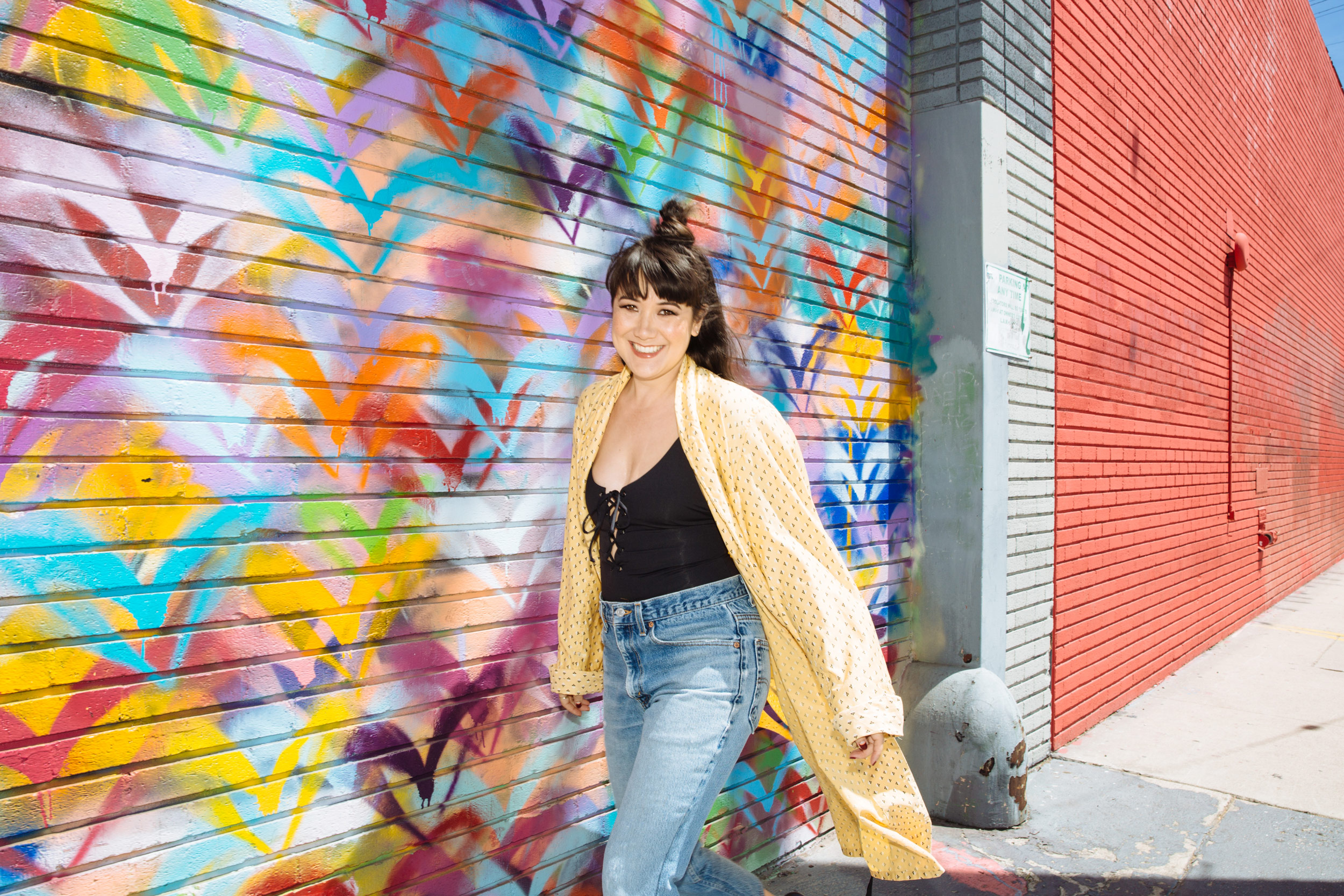
“One of the biggest lessons I’ve learned is that when you’re an artist or creative and are going after something, you have to go after it with everything you have—but at the same time, you have to do those things that are always on the bottom of your to-do list.”
Do you feel creatively satisfied? Most of the time. I don’t call myself an artist, but in some ways I think I am. It’s just that my art form is not traditional. My art form is bringing people together and allowing them to have experiences.
When I’m not fulfilled it’s because I’m a small business owner and have a lot of responsibilities that people don’t consider when they have an idea and start it. They don’t think about being successful enough to have employees, and when you have employees you become a boss. There’s a lot that goes along with that and it’s a great responsibility and an honor. I’m fortunate that I get to share my vision with others and have them help me create that vision, but I don’t create as much now as I used to when I started the business. So, yeah, I think I’m creatively fulfilled most of the time.
I want to ask you about the experience of your life taking an unexpected turn. You had an idea of what you wanted to do and that shifted. I’m reading a book called When Things Fall Apart right now, and the author, Pema Chödrön, makes a statement that we think certain things will bring us pleasure and certain things will bring us misery, but we don’t know. She advises that the most important thing of all is to leave room for the not knowing.
I loved that because it’s a reminder that we don’t know what the circumstances of our lives will bring our way. Going back to your story, you wanted to be on TV and you let go of that dream, but that made room for something new in your life. What’s your best advice to someone who is in that place of experiencing something unexpected or feeling like they’ve failed? That’s an interesting question because we’ve all been there. The thing I naturally want to say is, keep going. But that’s so general.
Some of us understand how to listen to our intuition, but I think most people don’t know how to listen to themselves. They may not even be aware of that. Instead, they listen to others and look to others for advice and input on whether or not their idea is good. The best advice I can give is to truly follow your heart, which I’m laughing at because it sounds like a terrible line. But I think that only you know what will truly make you happy and fulfilled. If you can learn to listen to the signals that you’re body is telling you—if something feels good, you do it.
The better piece of advice that goes along with follow your heart is that once you’ve made the decision to go after something, you have to go after it with absolutely everything you have so that nothing is left to your imagination. Give your heart and soul to it, so that even if it fails—which is the worst thing that could happen—then you at least know that you gave it everything you had. Making a decision and going after it is the best thing anyone can do because, otherwise, you live life wondering what could have happened. If you want something, you should go after it. You have no idea what the end result will be, but that’s part of the fun. You have to jump in!
>
“…once you’ve made the decision to go after something, you have to go after it with absolutely everything you have so that nothing is left to your imagination. Give your heart and soul to it…”
